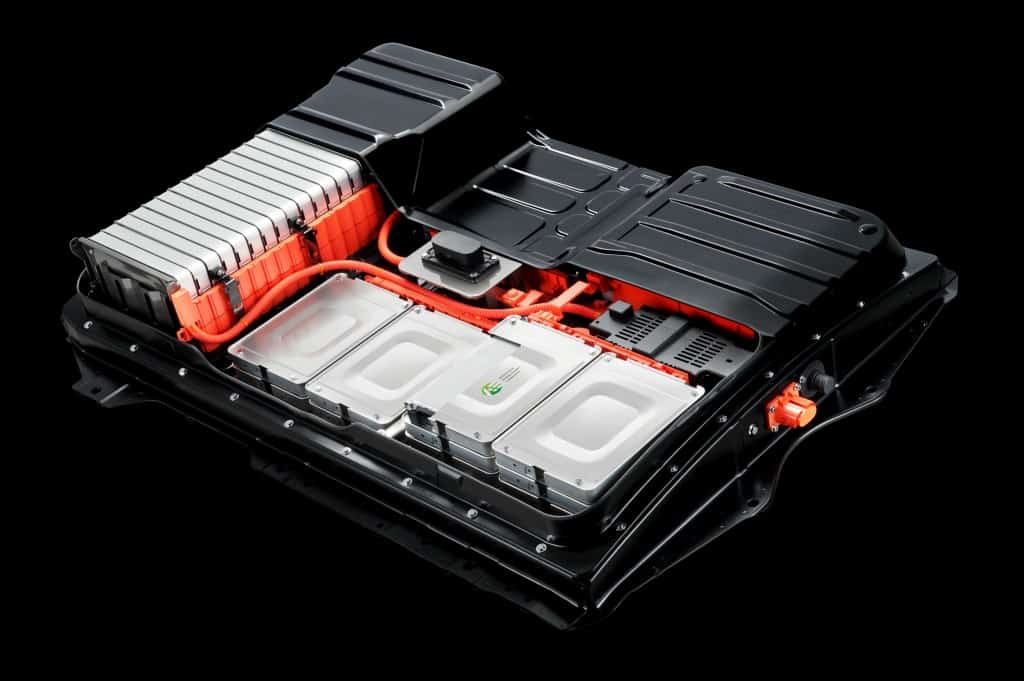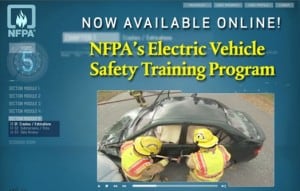 Due to urban legends and rumors about fires from laptop batteries, some people still think that electric car batteries are dangerous. Earlier this year, there was someone putting flyers on Tesla S cars in San Francisco, claiming that lithium-ion batteries “blow-up if they get bumped” and when on fire release toxic cancer-causing fumes. Electric Vehicles use lithium-ion batteries which are similar to laptop batteries. There were recalls of “exploding” laptop batteries made by Sony in Dell and Apple laptops in 2006. AUTO Connected Car has extensively researched the topic interviewing authorities and found that electric car batteries used in commercially available electric cars are very safe in most cases.
Due to urban legends and rumors about fires from laptop batteries, some people still think that electric car batteries are dangerous. Earlier this year, there was someone putting flyers on Tesla S cars in San Francisco, claiming that lithium-ion batteries “blow-up if they get bumped” and when on fire release toxic cancer-causing fumes. Electric Vehicles use lithium-ion batteries which are similar to laptop batteries. There were recalls of “exploding” laptop batteries made by Sony in Dell and Apple laptops in 2006. AUTO Connected Car has extensively researched the topic interviewing authorities and found that electric car batteries used in commercially available electric cars are very safe in most cases.
Battery Experts Explain Why Electric Car Batteries Are Safe
At the University of Michigan (UM), carmakers such as Chevy and Ford do their research, AUTO Connected Car interviewed Greg Less PhD., senior laboratory manager of the UM Energy Institute Battery Fabrication and Characterization User Facility.
“Electric car batteries don’t blow up when they get bumped” confirmed Dr. Less. All EV battery companies have tested the batteries with shaking, crushing, extra charging and more to make sure nothing will go wrong. The volume of chemicals that are flammable in lithium-ion batteries is much less than 20 gallons of gas and 5 quarts of oil in internal combustion cars. In fact, the amount of energy stored in EV batteries is far less than in the gasoline in the tank.
If you are in car accident in an EV, you should use the same precautions you would in any car accident. Pull over to the side of road, if it is safe. If you are not on a freeway, get out of the car. If you feel heat or smell something burning, stay away from the car, warned Dr. Less.
Dr. Less cautioned that converted gas-to-electric cars can be dangerous, depending upon who did the conversion and what kind of batteries are used.

We also contacted the University of California at Davis, where staff advises the state of California on EV policies. Andy Burke, PhD., research engineer with the UC Davis Institute of Transportation Studies, has been working in the EV industry since the 1970’s, EV batteries are technically safe with a very slight chance of a “short”.
“An unpredictable safety problem in EV lithium batteries is if a small metal particle gets imbedded in the materials when the cells are constructed. That can lead to a localized short circuit and hot spot, that could lead to a fire. That condition would only happen with a very small probability, like one in five million cells.” said Dr. Burke The short does not necessarily transfer to other battery cells. For example, Tesla uses fuses between each cell to isolate cells from one another and protect the pack of batteries from a local short.
 The Automobile Club has extensively researched electric cars along with their car batteries and has published annual Green Car Guides since 2011.
The Automobile Club has extensively researched electric cars along with their car batteries and has published annual Green Car Guides since 2011.
“Electric car batteries are safe and don’t explode,” said Michael Calkins, manager, technical services, AAA, who noted electric cars, have safety built-in, carmakers must meet thousand thousands of pages of safety guidelines.
Calkins said that EVs are designed to put the batteries away from the crush zones of the car for safety and weight distribution. In many gas cars the barrel-like gas tanks are in crash zones of the car body.
As to carcinogenic fumes allegation, burning anything can create carcinogenic gas such as burning an oak log in a fireplace produces carcinogens, added Calkins.
The Auto Club did find that EV batteries will not hold their charge as long in extremely cold or hot weather conditions.

Nissan spokesman Brian Brockman debunked the laptop battery comparison, “Nissan batteries are not the cylindrical design of laptop batteries.They are thoroughly tested, monitored, designed not to over-heat and are protected by three layers of shields.”
Brockman reported that Nissan ensured the battery pack was able to withstand a variety of conditions by putting the LEAF through tests including extreme temperatures, water immersion and crash testing.
Calkins also noted the comparison of EV batteries to laptop batteries is unfair, stating the laptop battery fires happened during the early years of lithium-ion development. Lithium-ion batteries including laptops and smartphone, today are much safer.
In the past six years in battery development, carmakers have learned to make batteries that are far more efficient than laptop batteries, safer and specifically engineered for cars, confirmed Dr. Less.
Just the Facts and Truth EV Battery Fire Lore
A big problem with Internet lore is that the bloggers, social media mongers or Tweetistas who spout apocrypha don’t take the time to research the truth. AUTO Connected Car tracked down what actually happened surrounding EV fires.

NHTSA (National Highway Traffic Safety Administration), the agency empowered to make safety rules and enforce them, requires carmakers to recall any kind of technology that is proven to be dangerous. NHTSA investigated two EV fires in the last few years for the Chevy Volt and Tesla S and recalled millions of gas-propelled cars.
After a high impact test on the Chevy Volt EV in 2012, a battery that was stored, caught on fire. Chevy reinforced the body of the Volt and added additional sensors. NHTSA reported that “Based on the available data, Chevy Volts or other electric vehicles do not pose a greater risk of fire than gasoline-powered vehicles.” NHTSA did point out that electric vehicles do have specific attributes that should be made clear to consumers, the emergency response community, and tow truck operators as well as storage facilities.
EV Battery Disconnects
First responders and emergency technicians have guidelines to deal with crushed cars or seriously damaged cars after an accidents noted Calkins.

EV batteries should be disconnected after an EV is completely disabled. Even the lead batteries in gas cars that have gone through accidents that are beyond a simple fender bender and in the not-safe-to-drive status should be disconnected. In fact, NFPA (National Fire Protection Association) offers special training for “Electric Vehicle Safety for Emergency Responders.

Tesla S Fires Rare and Now Shielded
In 2013, there were two “rare” fires in Tesla S cars the passengers were safe. Tesla, CEO Elon Musk, noted that it received more press than 200,000 gasoline car fires in the same year. Tesla pushed a software update to increase the ground clearance of the Model S at highway speeds. Then starting March 6 2014, all Tesla S cars are protected with a triple underbody shield. Shields will be retrofitted for to existing cars when serviced by Tesla. After a three-month investigation and the new underbody announcement, NHSTA closed the case.
On July 4, 2014, a stolen Tesla S during a high-speed police chase ran into the roof of a Honda on La Brea Avenue in Los Angeles. The Tesla hit a pole, split into two pieced and caught fire. The thief survived which surprised safety experts who called it an non-survivable crash. The incident is under investigation by Tesla.
Rear Ended EV Pros
“I drive an electric car every day and I feel perfectly safe. My EV is as least as safe as a gasoline car,” mused Dr. Burke, “In the case of being rear-ended, I would feel safer in an electric car than with a gas car with a gas tank in the back because gasoline burns almost instantaneously, batteries, don’t.”
Over a hundred years ago, in the early days of automobile development, the first horseless carriages were battery powered and people were afraid of using flammable gas combustion cars. Now the tables have completely flipped.
“Lithium-ion car batteries are safe. People don’t worry about putting a cell phone with a lithium-ion battery in their pockets but would never carry a flask of gasoline,” said Calkins from AAA that was founded in 1900.
